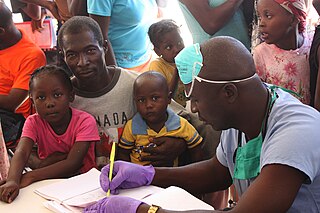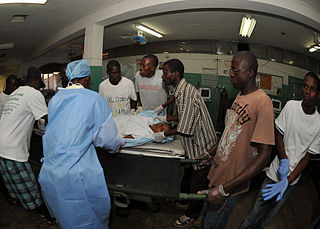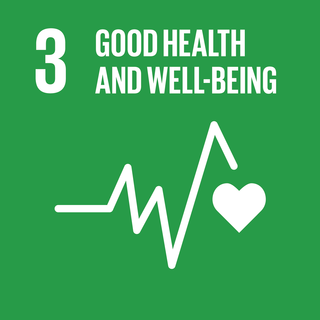The South Carolina Department of Health and Environmental Control is the government agency responsible for public health and the environment in the U.S. state of South Carolina. It was created in 1973 from the merger of the South Carolina State Board of Health and the South Carolina Pollution Control Authority.

Partners In Health (PIH) is a Boston-based nonprofit health care organization founded in 1987 by Paul Farmer, Ophelia Dahl, Thomas J. White, Todd McCormack, and Jim Yong Kim.

PATH is an international, nonprofit global health organization based in Seattle, with 1,600 employees in more than 70+ offices around the world. Its president and CEO is Nikolaj Gilbert, who is also the Managing Director and CEO of Foundations for Appropriate Technologies in Health (FATH), PATH's Swiss subsidiary. PATH focuses on five platforms—vaccines, drugs, diagnostics, devices, and system and service innovations—to develop innovations and implement solutions that save lives and improve health, especially among women and girls.

Deficient sanitation systems, poor nutrition, and inadequate health services have pushed Haiti to the bottom of the World Bank’s rankings of health indicators. According to the United Nations World Food Programme, 80 percent of Haiti’s population lives below the poverty line. In fact, 75% of the Haitian population lives off of $2.50 per day. Consequently, malnutrition is a significant problem. Half the population can be categorized as "food insecure," and half of all Haitian children are undersized as a result of malnutrition. Less than half the population has access to clean drinking water, a rate that compares poorly even with other less-developed nations. Haiti's healthy life expectancy at birth is 63 years. The World Health Organization (WHO) estimates that only 43 percent of the target population receives the recommended immunizations.
Afghanistan is a poor country recovering from decades of strife. When the transitional government was established in 2002, Afghanistan had a decimated health infrastructure and very low levels of access to health services. The infant mortality rate, <5 years of age mortality rate, maternal mortality ratio and total fertility rate in Afghanistan are among the highest in the world.
Health care services in Nepal are provided by both public and private sectors and are generally regarded as failing to meet international standards. Prevalence of disease is significantly higher in Nepal than in other South Asian countries, especially in rural areas. Moreover, the country's topographical and sociological diversity results in periodic epidemics of infectious diseases, epizootics and natural hazards such as floods, forest fires, landslides, and earthquakes. A large section of the population, particularly those living in rural poverty, are at risk of infection and mortality by communicable diseases, malnutrition and other health-related events. Nevertheless, some improvements in health care can be witnessed; most notably, there has been significant improvement in the field of maternal health. These improvements include:
The Expanded Program on Immunization is a World Health Organization program with the goal to make vaccines available to all children.
Health levels remain relatively low in Bangladesh, although they have improved recently as poverty levels have decreased.

The Millennium Foundation for Innovative Finance for Health is an independent, non-profit Swiss organization, established in November 2008 in order to create new ways to finance health systems in low- and middle-income countries. Based in Geneva, Switzerland, the Millennium Foundation aims to ensure that international commitments on improving health care are met through the development of innovative financing projects. Its first such project – called MassiveGood – was launched on 4 March, and will give travelers the possibility to add a $2, £2 or €2 micro-contribution to the purchase of a travel reservation, with all proceeds going to the fight against HIV/AIDS, malaria and tuberculosis.
FrontlineSMS is a free open source software used by a variety of organizations to distribute and collect information via text messaging (SMS). The software works without an internet connection and with a cell phone and computer.
Global Health Initiatives (GHIs) are humanitarian initiatives that raise and disburse additional funds for infectious diseases– such as AIDS, tuberculosis, and malaria– for immunization and for strengthening health systems in developing countries. GHIs classify a type of global initiative, which is defined as an organized effort integrating the involvement of organizations, individuals, and stakeholders around the world to address a global issue.
The 2010 maternal mortality rate per 100,000 births for Tanzania was 790. This is compared with 449 in 2008 and 610.2 in 1990. The UN Child Mortality Report 2011 reports a decrease in under-five mortality from 155 per 1,000 live births in 1990 to 76 per 1,000 live births in 2010, and in neonatal mortality from 40 per 1,000 live births to 26 per 1,000 live births. The aim of the report The State of the World's Midwifery is to highlight ways in which the Millennium Development Goals can be achieved, particularly Goal 4 – Reduce child mortality and Goal 5 – improve maternal health. In Tanzania there are only two midwives per 1,000 live births; and the lifetime risk of death during delivery for women is one in 23.
Malawi ranks 170th out of 174 in the World Health Organization lifespan tables; 88% of the population live on less than £2.40 per day; and 50% are below the poverty line.
Primary Health Centre (PHCs), sometimes referred to as public health centres, are state-owned rural health care facilities in India. They are essentially single-physician clinics usually with facilities for minor surgeries, too. They are part of the government-funded public health system in India and are the most basic units of this system. Presently there are 23673 PHCs in India.
The fertility rate was approximately 3.7 per woman in Honduras in 2009. The under-five mortality rate is at 40 per 1,000 live births. The health expenditure was US$197 per person in 2004. There are about 57 physicians per 100,000 people.

GAVI, officially Gavi, the Vaccine Alliance is a public–private global health partnership with the goal of increasing access to immunisation in poor countries.
A District Programme Manager (DPM) is a government official in India who monitors and plans district health strategies, as with the National Rural Health Mission and the District AIDS Prevention and Control Unit.
Children in Uganda are regularly exposed to many preventable health risks. According to the WHO, the country ranks 186th out of 191 eligible countries in life expectancy. The country also ranks 168 out of 188 in infant mortality rates, with a lower rank reflecting lower infant mortality. There are also about 97 infant mortalities out of 1,000. There are many cultural factors influencing the current health status of Uganda including the negative stigmas associated with sex, and the wood-burning stoves. The former[which?] of these has resulted in a severe lack in education and communication necessary to improve the health and well-being of children. There are multiple factors negatively impacting the health of children in Uganda. Those factors include HIV/AIDS, malnutrition, lack of sanitation, vaccinations, insufficient drugs, and an insufficient amount of motivated healthcare workers. The World Health Organization attributes the tragic situation to wars that occurred before 1986 as well as the HIV/AIDS epidemic. The HIV/AIDS epidemic has resulted mainly from the mother-to-child transmission that spreads from one generation to the next, which could have easily been prevented from educating mothers and providing them with medical treatment. Medical treatment could protect them and their children. The knowledge of HIV, how people can contract it, their individual HIV status and counseling for the disease. These are several factors that assist in the prevention of HIV/AIDS and the HIV/AIDS epidemic, which is the leading cause of the detrimental state of child health in Uganda.
Child Mortality in Ghana describes the child mortality in the country of Ghana. Like in other parts of the world, child mortality is declining in Ghana.

Sustainable Development Goal 3, regarding "Good Health and Well-being", is one of the 17 Sustainable Development Goals established by the United Nations in 2015. The official wording is: "To ensure healthy lives and promote well-being for all at all ages."





